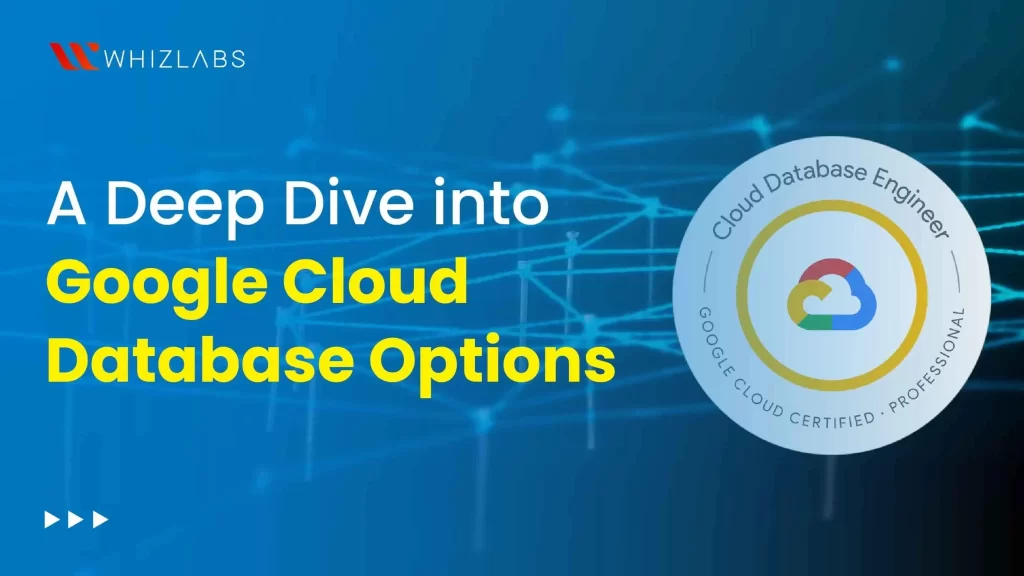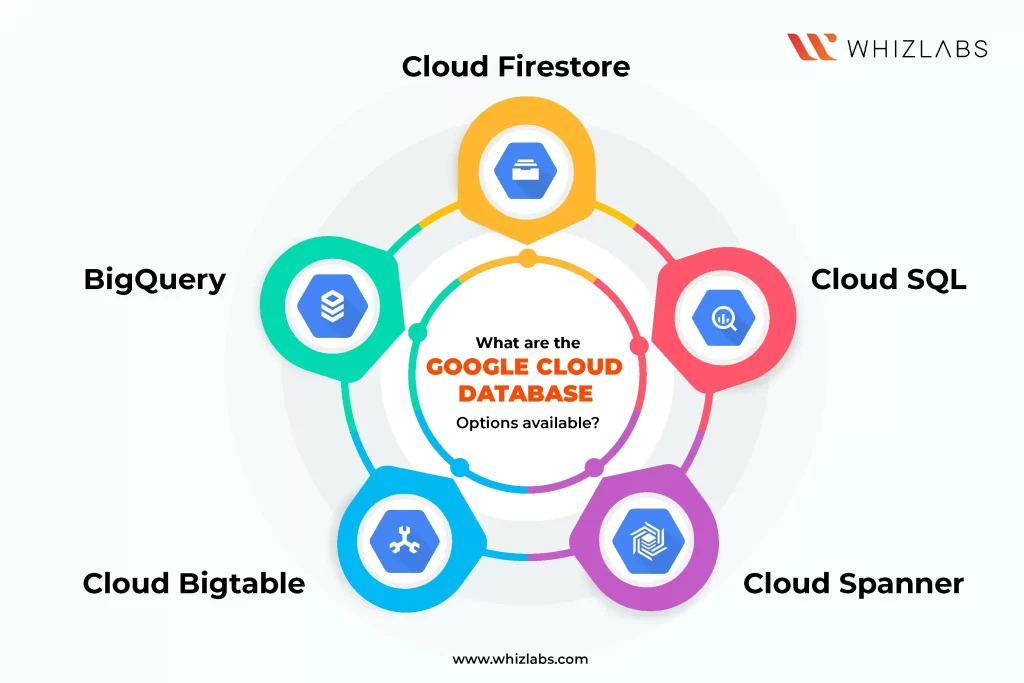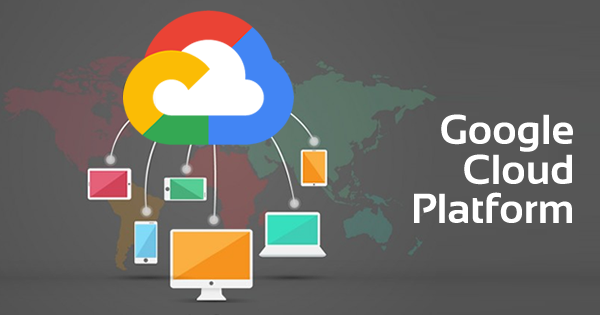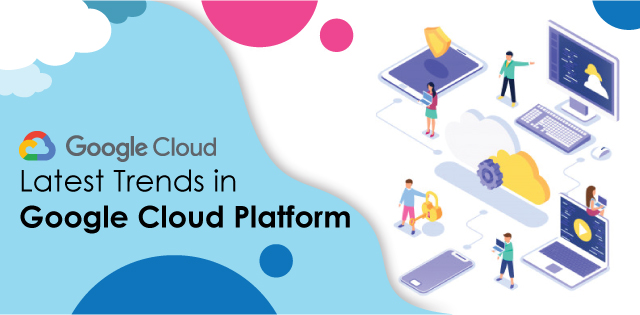Google Cloud Database is a flexible and scalable cloud solution designed to assist enterprises in efficiently managing and storing their data.
Its adaptability and broad compatibility with various business applications make it an exceptional option for minor projects and expansive corporate systems.
This blog aims to provide an overview of Google Cloud database solutions and delve into the important aspects of assessing and choosing that database service.
An Overview of Google Cloud Database
A cloud database refers to a database that is hosted and managed within a cloud computing environment.
Unlike traditional on-premises databases, cloud databases utilize infrastructure provided by cloud service providers. They offer numerous advantages, such as scalability, flexibility, and cost-effectiveness.
Businesses can access data from any location with cloud databases, promoting remote collaboration and sharing. They also reduce operational costs by eliminating the need for on-premises hardware procurement and maintenance.
Additionally, cloud databases allow for flexible scaling to accommodate changing data requirements, ensuring optimal performance and resource utilization.
These databases are available in two primary types: relational databases (SQL databases) and non-relational databases (NoSQL databases). This variety makes cloud databases adaptable and suitable for a wide range of data storage and retrieval needs.
Understanding Google Cloud database pricing is essential for businesses looking to optimize their cloud infrastructure costs.
What are the Google Cloud Database Options available?
Google Cloud has a wide range of database services, each having its pros and cons. Below, we are going to dive in-depth into some of the Google Cloud database options, which include:
- Cloud SQL
- Cloud Spanner
- Cloud Bigtable
- BigQuery
- Cloud Firestore
Cloud SQL is a fully managed relational database service compatible with SQL, MySQL, and PostgreSQL servers. It has unique features such as automated backups, disaster recovery, and data replication to ensure high resilience and availability. This database service can be integrated with BigQuery, Compute Engine, App Engine, and Kubernetes.
Use cases for Cloud SQL such as:
- SQL data analytics can be performed on a larger scale
- Supports storage system of content management system (CMS) and scalability
- Database management with the help of Infrastructure as Code (IaC)
- On-premise SQL databases lift and shift to cloud infrastructure
- Deploy and develop containerized microservices and applications
Cloud Spanner is a fully managed and relational Google Cloud database services. It is distinct from Cloud SQL by combining the benefits of relational and non-relational structured scalability. It delivers strong consistency across high-performance operations. It has core features such as automatic replication, multi-language support, and built-in security.
The common use cases of Cloud Spanner such as:
- Large-scaled applications need global distribution and increased consistency
- Enterprises require a scaled database without compromising transactional integrity
- High availability applications and reduced downtime
It is a fully managed NoSQL database service suited for highly operational and analytics workloads. Its features include high availability,sub-10ms latency, and zero-downtime configuration changes. It integrates with Apache tools such as Hadoop, TensorFlow, and BigQuery.
The cloud bigtable use cases such as:
- Real-time Data analytics and data processing.
- Time-series apps and Internet of Things (IoT) applications
- Gaming, Advertising, and financial applications that require efficient read or write access to bulk datasets.
Google Cloud Firestore
Google Cloud Firestore is a serverless fully managed database solution designed mainly for the serverless application. It can be used for data storing, querying, and syncing the data for mobile, web, and IoT applications.
It has the features such as live sync, built-in security, and offline support. It has the integration capability with GCP mobile development and Firestore to achieve easier app management and creation.
Some of the use cases of Google Cloud Firestore such as:
- Mobile and web applications with online and offline capabilities
- Multi-user and collaborative applications
- Real-time analytics
- Social media apps
- Gaming forums
- Leaderboards
Bigquery is a completely serverless data warehousing solution and it is mainly used to do the data analysis through query and SQL streaming data. This database service has in-built data transfer solutions to transfer the data from on-premises data such as Teradata.
The features of bigquery such as business intelligence, geospatial analysis, and machine learning. These core features can be achieved through the Bigquery GIS, BI, and ML Engine.
The use cases of Bigquery include:
- Process analytics and optimization
- Big data analytics and processing
- Behavioral analytics and predictions using Machine learning
- Modernization of Data warehouse
Why Opt for Google Cloud Database?
Now, you have gained a complete understanding of Google Cloud database platforms. Now, we’re going to see what are the reasons why businesses have to go for Google Cloud databases.
Managed Infrastructure
As we already know the Google Cloud database is a fully managed cloud infrastructure, eliminating the need for database management. It allows businesses to concentrate on app development and creation to save time and resources.
Scalability
All the Google Cloud database options have an automatic scaling feature to handle the changing workload needs without crashing. Whether you have an abruptly increased need for databases or have to satisfy the planned expansion, then this database service can automatically provision the extra resources to fulfill the demanding requirements with zero downtime.
Global Reach
With the availability of deployment options across multiple regions, you can ensure less delayed data access for users worldwide. Businesses can make use of this feature to reach targeted markets and scale their applications globally.
High Availability
One of the major reasons to opt for the Google Cloud database is its high availability. Through replication of the database and automatic failover capabilities, GCP achieves high availability. It also guarantees that the data will always be available, which reduces interferences and boosts application dependability.
Security
Google Cloud has significant security by adopting various security measures such as access control, security upgrades, and multiple robust safeguard options such as transit encryption and data at rest encryption.
Integration Options
Google Cloud database service integrates easily with the other Google Cloud services. Businesses can benefit from this feature by carrying out data analytics, machine learning and so on easily.
Diverse Database Options
Google Cloud supports diverse database solutions such as relational, in-memory, and No-SQL databases.
Google Cloud provides diverse database services, including relational, NoSQL, and in-memory databases. Businesses have the option to select multiple databases to fulfill the diverse needs of various applications and data processing requirements.
Cost-Effectiveness
The pay-as-you-go pricing approach of Google Cloud Database Services ensures cost efficiency, as businesses only incur charges for the resources they utilize.
Support and Reliability
Google Cloud provides outstanding support and service level agreements (SLAs), guaranteeing reliability and effective downtime management for critical applications.
Enterprises choose a Google Cloud database service due to its scalable, secure, and managed solutions. Developers leverage data management capabilities to create applications that empower users to extract valuable insights and foster innovation.
Which Google Cloud Database Option is best?
Even going through the above-detailed explanation of the Google Cloud database solution, it is difficult to predict which database solution suits your business. When opting for database solutions, considering the data workloads and flexibility in usage is essential. This enables you to find the right Google Cloud database solutions rather than trying to adopt all the database services.
Let’s see the usability of the Google Cloud database solutions in detail:
| Database Service | Suitable for |
| Cloud SQL | Suitable for relational database needs with storage capacity under 10TB and less than 4000 concurrent connections. Requires skills in on-premise management. |
| Cloud Spanner | Ideal for large-scale data needs exceeding 10TB with transactional consistency requirements. Suitable for horizontal scaling and sharding. Requires application rewriting if migrating from Cloud SQL. |
| Cloud Firestore/Datastore | Suitable for app development with a focus on live synchronization and offline support. Cloud Datastore is recommended for storing unstructured data in JSON documents, while Cloud Spanner is recommended for structured data with ACID compliance needs. |
| Cloud Bigtable | A good option for large single-key data sets with low-latency, high-throughput workloads. Preferred for single-region analytics. Cloud Spanner is preferred for multi-regional operations. |
| Cloud Memorystore | Ideal for key-value datasets with a primary concern on transaction latency. Recommended for caching purposes without disk-based data persistence. Not suitable for large volumes of data exceeding memory capacity. |
Pros and Cons of Google Cloud Database
Pros
- Automatic scaling adjusts databases to workload changes.
- GCP handles backups, fixes, and upgrades, reducing administrative burden.
- Strong security measures, including encryption in transit and at rest, can be set up by GCP and admins.
- Data replication and failover strategies to achieve data availability by reducing downtime.
- Seamless integration with other Google Cloud services enhances performance efficiency.
- Database deployment across multiple regions enables worldwide data delivery.
- The pay-as-you-go pricing model reduces costs and offers scalability.
- A diverse range of database types is available to cater to various application needs.
Cons
- Costs may fluctuate based on usage and could exceed budget for specific workloads.
- Certain database types may require specialized knowledge for setup and management.
- Internet access is necessary for cloud-based databases.
- Transferring data across regions or services may incur additional fees and infrastructure components.
- Switching to another vendor may be time-consuming and resource-intensive due to interdependencies.
- Managed services may limit certain database customization options.
- Specific regulatory constraints may complicate data management.
- Network latency, particularly in remote areas, can impact performance.
FAQs
How to migrate the current database to Google Cloud Database?
Google Cloud Platform offers a Database Migration Service to simplify the process of migrating databases from on-premises or other cloud providers to Google Cloud Database. Additionally, you can utilize tools and services provided by Google Cloud Platform to execute the migration.
What storage options are provided in the Google Cloud Database?
Storage options in Google Cloud Database include Cloud Storage, Cloud Memorystore, and the storage solutions available within specific database services such as Cloud SQL and Cloud Spanner.
Is it possible to use Google Cloud Database with other Google Cloud services?
Yes, Google Cloud Database seamlessly integrates with other Google Cloud services. Google Cloud Platform facilitates smooth collaboration with services like Google Kubernetes Engine, Cloud Dataflow, and many others.
Is the Google Cloud database free?
Google Cloud offers a range of databases with various pricing models, including some that offer a free tier or trial period.
For example, Cloud Firestore offers a free tier with limited usage, and Cloud Spanner provides a 90-day free trial with a specific amount of usage included. However, beyond these free tiers or trial periods, usage of Google Cloud databases typically incurs costs based on resource consumption.
Conclusion
Selecting the appropriate database or data warehouse service within Google Cloud requires careful consideration as it significantly influences the success of your project.
By comprehending the unique strengths and optimal use cases of each service, you can align your data strategy with the most suitable cloud database solution, thereby ensuring scalability, performance, and cost-effectiveness.
To explore each Google Cloud database option in real-time, you can opt for Whizlabs hands-on labs and Google Cloud sandbox.
- Top 25 AWS Data Engineer Interview Questions and Answers - May 11, 2024
- What is Azure Synapse Analytics? - April 26, 2024
- AZ-900: Azure Fundamentals Certification Exam Updates - April 26, 2024
- Exam Tips for AWS Data Engineer Associate Certification - April 19, 2024
- Maximizing Cloud Security with AWS Identity and Access Management - April 18, 2024
- A Deep Dive into Google Cloud Database Options - April 16, 2024
- GCP Cloud Engineer vs GCP Cloud Architect: What’s the Difference? - March 22, 2024
- 7 Ways to Double Your Cloud Solutions Architect Role Salary in 12 Months - March 7, 2024




